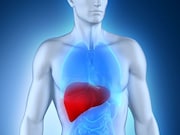In multivariate analysis, age, albumin concentration, T2DM independently tied to progression
FRIDAY, May 24, 2019 (HealthDay News) — Type 2 diabetes mellitus (T2DM) is a risk factor for progression of liver fibrosis in patients with nonalcoholic fatty liver disease (NAFLD), according to a study published online May 21 in the Journal of Gastroenterology and Hepatology.
Toshifumi Tada, M.D., from Ogaki Municipal Hospital in Japan, and colleagues examined clinical risk factors for progression of liver fibrosis in patients with NAFLD. Data were included for 1,562 patients with NAFLD (aged 36 to 64 years) and less severe liver fibrosis (FIB-4 index, <1.3).
The researchers found that 186 patients progressed to advanced fibrosis (FIB-4 index, >2.67) during follow-up. For progression to advanced fibrosis, the three-, five-, seven-, and 10-year cumulative incidence rates were 4.4, 6.7, 11.0, and 16.7 percent, respectively. Age, albumin concentration, and T2DM were significantly associated with progression to advanced fibrosis in the univariate analysis. Age ≥50 years, albumin concentration <4.2 g/dL, and presence of T2DM were independently associated with progression to advanced fibrosis (hazard ratios, 2.121, 1.802, and 1.879, respectively) in multivariate analysis. For progression to advanced fibrosis, the three-, five-, seven-, and 10-year cumulative incidence rates were 3.6, 5.0, 8.2, and 12.9 percent, respectively, in patients without T2DM and 6.1, 10.4, 16.7, and 24.0 percent, respectively, in patients with T2DM.
“Presence of T2DM was an independent risk factor for progression to advanced liver fibrosis in addition to advanced age and low albumin concentration,” the authors write.
Copyright © 2019 HealthDay. All rights reserved.








